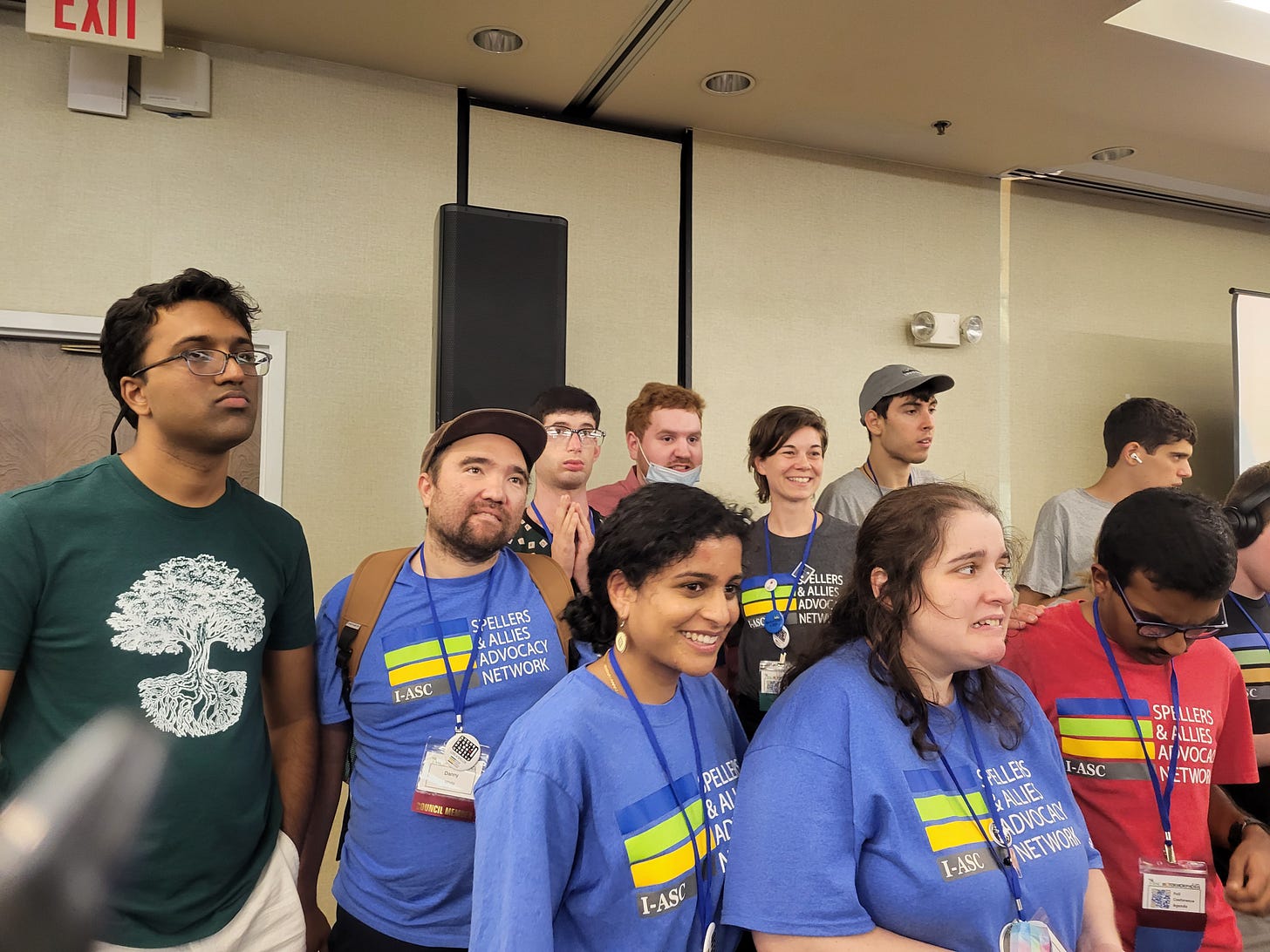IMPORTANT LINKS
Spellers and Allies Advocacy Network’s Communication Equity campaign
I-ASC on Facebook and Instagram (where Spellers and Allies makes their social media posts)
Diversity trainer Yasmine Simone Grey (who delivered the diversity training for I-ASC)
Black autistic advocates to follow:
Tiffany Hammond - Fidgets and Fries, and on Instagram
TJ - Nigh Functioning Autism, and on Instagram
Kaishawna - on Instagram
TRANSCRIPT
Danny: Hi, all! And welcome back to All Our Brave Hearts!
Tara: It's been a little while, hasn't it, Dan Dan? Nice to be back.
D: I'm so glad to be recording again. I am sad you are leaving Tara.
T: Yeah Danny, I'm gonna miss you too. So, like this time last year, I am about to go to Southeast Asia. A bit of a shorter trip this time, just about four weeks instead of close to eight. So that's nice.
It's been a busy time, and we haven't had a lot of time to just sit and hang out. I knew I was going to miss you, but it's hitting me how much I'm going to miss you.
D: Yeah, so I'm sad.
T: And this also means that even though we're coming back with this episode, it's going to be a little while until the following episode. But Danny really wanted to get this one out during the month of April, as part of his work with a group that we'll talk about in a little bit.
Am I spoiling it?
D: No, it's a sneak peek.
T: This is a sneak peek.
So I'm going to ask the question first this time: What's something brave you've done lately?
D: You beat me to it!
T: I sure did. Are you ready with an answer?
D: I am.
(00:03:02):
I will say that I am being brave going to a day program after many bad memories, from terrible day programs in the past.
T: Yeah, that does take a brave heart to try something that, even though it looks different in really important ways - just the idea that you're trusting that this program is going to be better despite all of the very ingrained, very hurtful experiences you've had in past programs. I think that's definitely brave.
D: It is turning out to be great though.
T: I'm so happy. So for those who don't know from Danny's social media, he started this day program that is specifically for spellers. So they understand presuming competence. They understand what spellers are interested in and what spellers can benefit from. And this program is for adults, I think age 21, 22 and up. So it makes it easier for them to tailor it to be, you know, age appropriate.
And I've been really happy to see how much you've been enjoying it, Danny. You can spend time with speller friends among people who care about you and who know how to support you three days a week.
D: It is so good!
T: And you also have a new personal aide which is the first time we've hired someone to work with you. And she seems also great. She's very proactive. She's learning how to spell with you through this BAE program.
And that's also brave, I think, Danny. I know this is something you wanted, but trusting that you can find someone, hire them, and build this relationship over time.
D: Totally. She is awesome.
Tara, how about you?
T: So as you know, Danny, I've been making some big changes in my life recently, and that I think always comes with a need for courage. So it's actually felt good. There's a list of brave things I could share, but what I'll choose now is reaching out to friends and family to help me and just opening myself up to accepting the generosity and care that they might offer.
I have a real fear of appearing presumptuous or of inconveniencing people. I think it's always been a little hard for me to explicitly ask for help. And it felt really nice to be in a place in my life where, like, yeah, I do need support, I do need people to help me in different ways. And to just feel their care and their happiness to help. So that's a brave thing I did recently, and it felt really nice.
- NOTE: -
T: So, just a note we split recording this over two days because Danny has been just not feeling good in his body and it continues today that I'm about to go out of town for a while so the conversational part of this is going to be shorter than usual it's going to be less sprinkled throughout the episode because Danny is really struggling with dysregulation.
D: I'm having such a tough time. And I'm sorry that I can't do more chatting in this episode.
T: Yeah, Danny, that's really hard to see you go through a hard time. Of course, it's stressful for everybody involved - most of all, you. You know what? We're doing what we can.
D: I am so upset to not be able to be in a better place, and I will miss you.
T: I will miss you too, hon. So what do you want to do with regard to this episode? Shall we just dive into the text-to-speech?
D: Sure
T: And do you want me to record my part separately?
D: Yes
T: Do you want to chat at all for any other part of the episode?
D: No. I am just going to say that this is such an important topic and I hope you all agree.
T: Yeah, I agree. It is an important topic. You want to stop? Okay, stop.
- END NOTE -
D: So it is unfortunate that spelling methods are laborious and can be difficult for people to access. It takes at least one dedicated communication partner, plus ideally a practitioner to train them. That costs money and time. Many families don't have much of either to spare.
T: Yes, that's the unfortunate truth of the situation. Spelling is an amazing gift for nonspeakers and their loved ones and communities. Unfortunately, it's not some magical miracle that just appears and once you have it, you have access to it forever. No, it takes quite a few resources to learn how to spell, both for the nonspeaker and for any communication regulation partners (CRPs), and it takes quite a few resources to maintain that access to spelling throughout the nonspeaker's life.
You know, training with a practitioner is really heavily advised. Of course, it's not 100% necessary in every case. There are many families who have done very well without one. But in most cases, I would say it is really heavily advised to at least start off with a practitioner. And of course, that's an expense that many families can't afford.
And it's not just the expense, also there's the time spent bringing the nonspeaker to their sessions, for example. And then in terms of that speller's communication regulation partners, which are often family members: not every family has the privilege of having someone who can spend the time to do that, who can rearrange their career, for example, to have a flexible schedule so they can spend the time to learn how to be a CRP, practice with the speller, and thereafter be available regularly as a speller's CRP.
And of course, there's also the option of hiring an aide. But of course, that also requires money.
So the pathways to a nonspeaker having sustained access to spelling to communicate, unfortunately, are laborious and require a lot of money, time, and person power.
D: And such barriers are influenced by socioeconomic class, and race. As if just being disabled with nonspeaking autism weren't tough enough! I am not suggesting that my peers from white, upper middle class or wealthy families have it easy. I know they don't. But they don't face the barriers that come with lower incomes and different racial identities.
No one should go without communication access due to their identities. And already marginalized communities are the ones who face the most obstacles in diagnosis, support, and accessing methods like S2C.
T: Yeah, I love how you clarify the notion of privilege, Danny. When someone is told that they have privilege, it doesn't mean they've never struggled or they have no difficulties. It means that compared to another group of people, they have not experienced certain struggles that that group of people have.
And so this is something that comes up a lot with race, with gender, with gender identity and sexual orientation, with socioeconomic class. I think it is difficult for people who've never experienced a certain kind of struggle to, first of all, even be aware that such a struggle exists and to really understand what that struggle is like.
And that brings me to what I've been assigned to talk about, during my time here in this podcast: Danny wanted me to talk about DEI 101. And I'm not the most qualified person to do this, but I will do my best. So we have diversity, equality, or equity, and inclusion. Of course, DEI has been vilified in recent times, which is a shame because these are all good things! And just because you're promoting DEI does not mean that you're "unfairly stealing" opportunities from people who are the predominant group of people in terms of who has power and privilege. It really is an enriching of the different arenas in which we exist, right?
And I think many of us, those of you listening to this podcast, many of you have speller loved ones, nonspeaking loved ones, you've probably spent a lot of time and energy and passion fighting for inclusion of your disabled loved one.
That push for justice doesn't need to and really shouldn't just stop at that identity of “disabled.” Because it's not a homogenous community. The disability itself is, of course, an important part of someone's identity. But within, let's say, the umbrella of nonspeaking autistic folks, the umbrella of spellers, we have spellers of different races, different genders, different gender identities, sexual orientations, cultural backgrounds, socioeconomic classes, etc.
Something that's really important to consider when we're thinking about issues of inclusion is how each of those identities experiences barriers and opportunities, and how the intersection of those different identities also might play out. And so looking at it from that point of view is called intersectionality.
That is really important when we're looking at a community of spellers. It's not just advocating for the rights of nonspeakers. It's also advocating for the rights of BIPOC nonspeakers (so that would be Black, indigenous, and people of color) because their experiences are different in many ways from the experiences of their white peers.
I also want to say something here that a lot of people who mean well will say something like,
I don't see color!” thinking that that communicates a great spirit of equality. But there is a lot of important meaning, both in positive and negative ways, to racial identity. People are proud of their racial identities. It's linked to how they were brought up, to their heritage. It is important in positive ways.
And, when we say something like, “oh, I don't see color,” it also diminishes the very real struggles that people face because of their racial identity.
So I'm trying to think of what else to kind of put in here to fulfill Danny's brief of me explaining this all to you… I think the most important thing when we're working across these different identities is to have a little humility (maybe a lot of humility) in acknowledging that each of our individual experiences in life do not represent the totality of human experiences in the world.
So, you know, a man would never understand what I've experienced in terms of sexism as a woman, right? Similarly, I , as a biracial white-Asian individual, I don't really know what it means to operate in this world as a Black person. I've definitely had some vaguely racist things said and done to me, but I don't know what it's like to have that be so much more a part of how you're needing to to move around in the world, to have that be so much of a part of what you have to be vigilant of.
So realizing that just because we don't ourselves have firsthand experience with something,it doesn't mean that others don't experience it. And I think we need to be not only open to hearing what people share, but also curious. And we need to seek out ways to better educate ourselves about what those experiences might be.
D: I am still needing to learn more about what my Black, indigenous, and Latino peers and families experience as a result of their identities. And my Asian peers are not homogeneous, as no group is, so I only know my own story in detail. I don't assume that my own experiences apply to everyone who has the same disability. I am trying to be a better ally to those who I don't represent, but still care about.
For me, my race has not had a significantly negative impact. But I still have worries that my white peers don't. I am worried about my mom's safety, which was a heightened concern during high-profile Asian hate events during the pandemic. Now, I am worried that our status as permanent residents is more vulnerable due to the new administration in this country. I also feel more severely the threats to my services funded through Medi-Cal, without which my mom and I would need to move out of the country, because financially, we could not cover my needs and pay rent without it. This is not racial, but socioeconomic conditions are often correlated with race.
T: That's an important point, Danny. There are certain things that do correlate with race and socioeconomic conditions is one of them. And it's not just about the immediate issues of the direct racism. And we're not just talking about who can afford access to spelling to communicate. It's also who is likely to even be aware of spelling to communicate, who's likely to be in a context where services like that are being explained or advertised.
What I've learned is that Black autistic kids on average get diagnosed much later than their white peers, which means that there's a delay in their access to services, for example.
And when we're talking about safety, how Black autistic individuals operate in the world, really has to carefully consider more than their white counterparts how the general public or police might react to them stimming or being dysregulated in public.
There have been some really excellent posts from Tiffany Hammond on social media as Fidgets and Fries, as well as Nigh-Functioning Autism (TJ), two Black content creators who are advocates and who share what the Black autistic experience is like.
One thing that I really appreciated learning from them was that, well, it's quite commonfor autistic advocates to be very anti-ABA. And Tiffany and TJ, they shared that they're not necessarily saying that ABA is great, but they're saying that with Black autistic kids, their families do feel a need to pursue services like ABA because their kids are more at risk of really dangerous, aggressive interventions if they are stimming or dysregulated in public.
I don't think I explained that very well, but you should go check out their social media anyway and read what they have to say.
Yeah, it can all be quite complex. And we all who are not experiencing these things directly, we all have a lot to learn.
D: I am part of the Spellers and Allies Advocacy Network, the advocacy branch of the International Association for Spelling as Communication (I-ASC). We are a group of adult spellers and speaking allies, working on issues important to us. I am on our committee for our Communication Equity campaign, to advocate for more equitable access to spelling methods.
This is a passion of mine. I firmly believe that access to communication is a human right. And it is deeply unfair that populations that are already marginalized face such marginalization in this area, too. It is a mission of mine to contribute to my most underserved peers' access to the life-saving world of communication.
T: Yeah, I love that this campaign is happening, Danny. This is actually something that Danny has been really wanting to be involved with since over a year ago at Motormorphosis 2023. He was part of a BIPOC panel, along with Fidgets and Fries (Tiffany Hammond), and Nigh-Functioning Autism (TJ), as well as Will Warren, who is part of the team that founded Brothers Helping Spellers, which is a great fundraiser - Danny will mention more about them.
And it was recognized at the time that a panel was a good start, but a very small step and definitely not enough. And for those of you listening, if you don't know, Motormorphosis is an annual conference centered around spellers and it's held by I-ASC (International Association for Spelling as Communication).
So this campaign by Spellers and Allies Advocacy Network is kind of the next step follow-up to that panel. And it's really focusing on raising awareness among the spelling community and whoever is interested in the general public on the need to consider disparities in access to spelling and access to communication.
And so that's been involving sharing information on how access to services is unequal across race, but also sharing people's stories, sharing this podcast (this is actually part of their campaign). And they're hoping to have some collaborations with BIPOC advocates as well.
They realize that this, again, is just one of the first steps and that really coordinated actions will need to be taken in the medium to long term to make headway on these issues.
So if you want to follow their campaign, follow I-ASC's social media. I will endeavor to remember to put links to that in the transcript. But you can look! I know on Facebook, it's International Association for Spelling and Communication. On Instagram, I think it's I-ASC Spelling with perhaps an underscore in there. I don't have great internet access at the moment, so I can't look it up.
One thing I wanted to share about this campaign was that even though Danny was really eager to get things rolling over a year ago, a lot of the white members of Spellers and Allies were completely open and eager to help, very sincerely enthusiastic about pushing this campaign forward, but they weren't necessarily confident in how to do so or in their own awareness of the issues. And one of the coordinators was quite concerned that what we would end up with would be a campaign that rested very much on the labor of the non-white members of Spellers and Allies, which didn't seem particularly equitable.
So they paused and arranged for a diversity training for Spellers and Allies and for I-ASC leadership in general. That was featured in one of the recent posts on this campaign on the I-ASC social media. So I just thought that was an interesting little insight to the campaign to share.
D: And we need to understand the interconnected barriers to access to communication, from more in-depth collaborations with underrepresented groups. Is it awareness, access to services in general, availability of resources, cultural perspectives, and how does racism, sexism, and prejudice against other forms of identity interact with all that?
It is a matter of human rights and dignity to enable access to communication.
This campaign is an early step in what will need to be sustained and dedicated work to make communication access more equitable. We face deeply inequitable systems, and even getting communication access for the most comparatively privileged nonspeakers is a challenge. It feels so daunting. But it is important.
T: Yeah, I'm really glad to see this campaign rolling, Danny, and I know you are too. I should mention that it is being led by one of the Spellers and Allies nonspeaking coordinators, Tyler Mason, and he's been working really hard on making this happen, as well as the rest of the communication equity campaign team, along with their speaking allies who are involved.
D: So for you all: what can you do? Donate if you can to Brothers Helping Spellers and I-ASC's Speller Access Fund. Ask yourself if you have friends who are part of underserved populations, and share this information on spelling to them, while listening to their perspectives on accessing this kind of service. Follow BIPOC accounts on social media to educate yourself on their experiences. And of course, listen to BIPOC experiences and learn to understand perspectives that might be new to you. That is so important.
That is it for this episode. But we will say and share much more on this in the future. Thank you as always for being with us!
- NOTE -
T: Danny wanted me to include, or rather to introduce, this addendum that we will be playing at the end of me talking. These are his prepared remarks for the BIPOC panel at Motormorphosis in 2023.
I also want to say that, again, as we mentioned in our introduction, Danny was having a really rough time when we were trying to record this. And so I have been recording my component of this from my hotel room in Manila, where I have been meeting with families of nonspeakers, hoping to get spelling to communicate going here.
Anyway, I know that we didn't have our usual back and forth chatting, which I love so much. It's always fun to record these with Danny. And I know he really felt so sad that he couldn't finish this recording with me.
But that's just how it is, right? That's the reality. And I think it's actually good that we have an episode like this. I mean, it's not good that he's dysregulated - that's very stressful for him. But it's good to show you, our listeners, that these things happen and we can operate around them.
And that's just life. So I will end by presenting Danny's notes that he presented at the panel for Motormorphosis a couple of years ago.
Please enjoy Danny's words. As always, I think they are brilliant. And thanks for being with us.
- END NOTE-
---------
Danny’s remarks from Motormorphosis 2023 BIPOC Panel:
We need to recognize that communication access does not exist in a vacuum. And that communication is power. As a community striving for inclusion of nonspeakers, we need to also ensure that we work for the inclusion of intersectional identities beyond white males. This is also for the strengthening of our community. We learn more from diverse voices. We grow in ideas and approaches and also in our ability to change the world. So it is both the right thing to do and the smart thing to do.
I think we Spellers are an amazingly open and inclusive community. But it takes more than being passively inclusive. And I know many of us desire a community that is truly a beacon for justice and equality, and we will be stronger for it.
This requires a combination of long-term systemic change, and more immediately feasible steps. Access funds like Speller Access Fund and Brothers Helping Spellers are a great start. Getting spelling approved for better coverage by services also is an important medium-term step. And what we then need is sustained engagement and involvement in more communities. Practitioner training, family outreach and peer support, and connecting with other programs like the foster system and adult group homes and medical professionals in diverse communities will be so important. And we need to partner with groups working for racial justice. There are powerful synergies to be explored.
And for us who are here: let's be ever mindful about our community. How are we, even in any of our activities, making room for more diversity? How are we challenging ourselves to be truly inclusive? How are we learning about people other than our ethnicity or race? All our individual efforts are important, too
.















Share this post